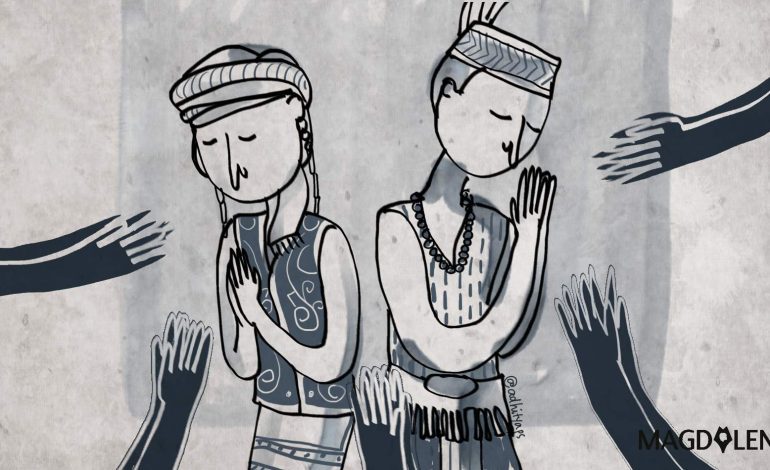Sulawesi Teen Group Fights Child Marriage

Mataram, West Nusa Tenggara – At 17 years old, Hasmita Nurzakia is not your regular high school student. With her friend Nur Afifa, 16, she has been actively campaigning to stop child marriage in her home town in Gowa District in South Sulawesi through their organization Kelompok Sebaya Anti Perkawinan Anak Gowa (Kesatria Gowa), which means Anti-Child Marriage Peer Group.
“We approach friends, communities, and family to educate them about the risks of child marriage,” Hasmita, who is in grade 11 in high school, said in a recent interview with Magdalene in Mataram, West Nusa Tenggara Barat.
She and Afifa had just finished performing the traditional Makassar dance Butta Kalassukangku mixed with salsa dance in the city during a youth conference organized by Oxfam Indonesia.

Child marriage rate in South Sulawesi is alarming, she said. One of her friends had married at 14, she recalled, and she would “post sad stuff on Facebook, as if her marriage is a burden to her.”
Her friend Afifa chimed in, saying South Sulawesi ranks fifth in child marriage at 6.7 percent, compared to the national rate of 2.46 percent. According to the Central Bureau of Statistics (BPS), the highest number of underage marriages in the whole province is in Gowa District, reaching 60 percent of total marriages, she added.
Economy and lack of education are the main reason behind the high rate of child marriage. Most people are ignorant of child’s rights and the risks of underage marriage. Poverty causes a lot of children to drop out of school.
“There are many parents who can’t afford to pay for their children’s school, so they use marriage as a way out. This has been a tradition for a long time,” said Emmy Rahmayanti, of Makassar Women’s Legal Aid (LBH APIK) in Makassar.
The Indonesian Marriage Law sets the minimum marrying age at 16 for female and 19 for male, although the state determines a child as a person under 18 years of age. Last year 333 children were officially registered to married in Gowa. Many underage marriages remain unregistered.
Emmy stressed that changing mindset and culture is not easy when it comes to ending underage marriage.
“People disregard the impact of child marriage. Many are proud that their children can ‘sell fast’. Worse even, religious leaders allow child marriage because they believe it is OK for an underage girl to get married once she has her period,” said Emmy.
“We want to change their mindset by continuing to inform them of the negative impacts of child marriage: the health effects, physical violence, impoverishment of children. The responsibility and burden of the child at a very young age is huge,” she added.
Child brides have no idea how to function as wives and, as a result, they tend to be victims of domestic violence at home and end up being divorced. Many may die during childbirth because their bodies aren’t ready yet.
“If a child is married to another child, both of them are the victims. When a boy becomes a husband, he is forced to work to provide. While other boys are playing football, they work as laborer. The psychological pressure he experiences is immense,” said Emmy.
“In many cases, women and/or girls become poorer when they get married at a such young age. Child marriage can also lead to impoverishment of information because they couldn’t continue school,” she added. Initiated by LBH APIK Makassar, Oxfam Indonesia and the Department of Women and Child Empowerment (Dinas PPA) of Gowa District, Kesatria Gowa aims to end child marriage through programs, workshops and campaigns.
Initiated by LBH APIK Makassar, Oxfam Indonesia and the Department of Women and Child Empowerment (Dinas PPA) of Gowa District, Kesatria Gowa aims to end child marriage through programs, workshops and campaigns.
“We raise awareness among teens who are already active in the child forum. The themes range from child’s rights, gender and sex, risks of child marriage to violence against women children. The aim is for them to spread it to their friends and community,” said Emmy.
The 18 teenagers, aged 14 to 19, who make up the group coined the name Kesatria Gowa, which means Gowa Knights, because it sounds catchy. They have also come up with other catchy-sounding names for their programs, such as Petasan, which literally means fire crackers, but is an acronym for peer approach and Sop Paru, named after soup containing beef’s lungs.
“We target elementary to high school students through group discussions at schools and communities, such as what consent is,” said Hasmita.
The teens also take to the streets to act and campaign against child marriage, giving, for example, stickers bearing slogans like: “Ia m happy when I’m playing not married”, or “We want a diploma, not a marriage certificate!” or “We want to have achievements, not a baby.”
As many child marriages also occur because of sexual assaults, the group also takes to the streets to raise awareness of this problem.
“As a young generation, we must be a ‘pelopor dan pelapor’ (pioneer and reporter) in case of violence against women and children, including child marriage,” said Afifa.
Also in West Nusa Tenggara: how youth group fights radicalism in their own turf. Follow @bunnnicula on Twitter.






















